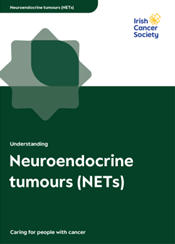Neuroendocrine tumours (NETs)
Signs and symptoms
Learn about the signs and symptoms of NETs. You are more likely to survive cancer if you find it at an earlier stage.
Treatment
There are a number of different treatments available for NETs. Your medical team will explain the best treatment options for you.
What are NETS?
NETs are rare slow-growing cancers (neuroendocrine cancers) that affect cells in your neuroendocrine system.
Neuroendocrine cells make hormones in your body. Hormones help to control many of the functions in your body. Examples of hormones are serotonin and insulin. Some NETs make extra hormones. These are called functioning NETs. These extra hormones in the body can cause symptoms.
Read more about NET symptoms.
Most NETs are found in your digestive system. This includes your oesophagus, stomach, bowel, back passage (rectum) and appendix.
NETs can also affect other areas of the body. These include your lungs, pancreas, kidneys, ovaries and testicles.
Ways to describe neuroendocrine cancers
Neuroendocrine cancers and neuroendocrine neoplasms (NENs) are umbrella terms covering cancers that start in neuroendocrine cells.
NETs (neuroendocrine tumours) and NECs (neuroendocrine carcinomas) are types of neuroendocrine cancers.
NETs is the term most commonly used at the moment.
Types of NETs
The term NETs can be used to refer to different types of tumours. For example, carcinoid tumour, gastroinstestinal NETs, pancreatic NETs, and lung NETs.
Read more about the types of NETs.
Connect with others
Because NETs is not a common condition, it is even more important for you to get as much support as possible. There are other people like you and many groups that want to help you.
NET Patient Network is asupport and advocacy group for neuroendocrine patients and their families. It provides information on NETs and organises patient support meetings.
What increases my risk of NETs?
The cause of NETs is unknown. But there are certain things called risk factors that can increase your chance of developing them. These include:
Men are slightly more at risk than women.
It is more common in older people, especially over the age of 60.
Black men of African descent have a slightly higher risk.
Your risk is higher if you have a rare family syndrome called multiple endocrine neoplasia type 1 (MEN1) or a condition called neurofibromatosis.
If you have certain stomach conditions such as peptic ulcer or Zollinger-Ellison syndrome, your risk may be higher.
Smoking may increase the risk of NETs. More research is being done on this.
Having a risk factor doesn’t mean you will get cancer. Sometimes people with no risk factors get the disease. If you’re worried, talk to your GP or to one of our cancer nurses. Call our Support Line on 1800 200 700 or visit a Daffodil Centre.
Medical content updated from our 'Understanding neuroendocrine tumours (NETs)' booklet (2024), reviewed by Prof Dermot O'Toole, NET Specialist and Professor in Gastroenterology; Dr Hussein Almeamar, Consultant Neuroendocrine Tumours Physician; Lisa Cullen, NET Nurse Coordinator; Ellen Beirne, Senior Pancreatic Cancer Care Dietitian (former Senior Hepatobiliary and Neuroendocrine Tumour Dietitian).
Continue reading about Neuroendocrine tumours (NETs)
Talk to a Cancer Nurse

Support Line
Our Daffodil Centres


